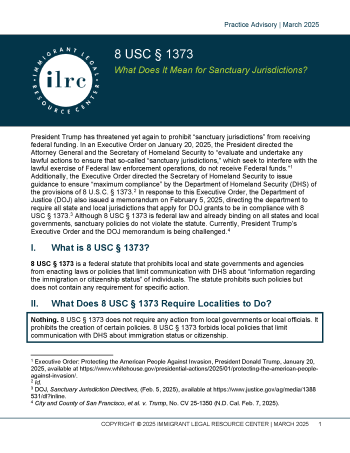The Immigrant Legal Resource Center (ILRC) immigration attorneys’ expertise focuses on family-based immigration, humanitarian relief, naturalization and citizenship, immigration enforcement, and removal defense.
Since 1979 we have helped expand the immigration expertise of attorneys, nonprofit staff, criminal defenders, and others assisting immigrant clients.
In addition to authoring the ILRC’s practice manuals, our expert attorneys have been published by Continuing Education of the Bar (CEB), American Immigration Lawyers Association (AILA), ILW.com, Huffington Post, Sargent Shriver National Center on Poverty Law, Center for Law and Social Policy, The Hill, LexisNexis Emerging Issues, and Fox News Latino.
We have also provided training to National Council of Juvenile and Family Court Judges, National Association of Criminal Defense Lawyers, American Immigration Lawyers Association (AILA), American Bar Association Commission on Immigration, Federal Bar Association, The State Bar of California, Legal Aid Association of California, Judicial Council of California and more.
Millions of Immigrant Families Left Out By U.S. Supreme Court Split Decision
FOR IMMEDIATE RELEASE
June 23, 2016
Contacts
Kemi Bello, kbello@ilrc.org, (415) 321-8568
California Senate Passes Historic Dignity Not Detention Act
FOR IMMEDIATE RELEASE
June 1, 2016
Contacts
Kemi Bello, kbello@ilrc.org, (415) 321-8568
170 Organizations Urge Senators to Oppose Anti-Immigrant Bills That Seek to Undermine Public Safety
FOR IMMEDIATE RELEASE
July 6, 2016
Contact
Kemi Bello, kbello@ilrc.org, (415) 321-8568
170 Organizations Urge Senators to Oppose Anti-Immigrant Bills that Seek to Undermine Public Safety
DACA at 4: Report Highlights Successes, Advises Fixes in Light of Supreme Court’s Tied Ruling on Related Initiatives
CIRI AWG PRESS RELEASE
July 19, 2016
Contact: Karina Martinez
kmartinez@ufwfoundation.org
WASHINGTON— More than 728,000 people who have been able to improve their lives since Deferred Action for Childhood Arrivals (DACA) was implemented, and President Obama’s executive action to protect certain immigrants from deportation can still benefit many people.
For questions regarding our webinars or recordings, please send an email to seminars@ilrc.org.

Gov. Brown Signs Key Drug Reform Bill into Law, but Vetoes Another
SACRAMENTO —California Governor Jerry Brown today signed into law a key piece of drug reform legislation known as AB 1352 to help protect communities of color, including immigrants, from unjust consequences of the criminal justice system. At the same time, the Governor vetoed another measure, AB 1351, which would have brought further reforms to sentencing for certain drug crimes and limited disproportionate consequences for immig
More Than 50 California Groups Urge Sens. Feinstein, Boxer to Stop Efforts to Undermine California Law; Expected Legislation Would Bully Local Authorities
“We are deeply concerned that leaders in the state with the largest immigrant population in the country are willing to consider or lead legislative efforts to mandate local and state police entanglement with federal immigration enforcement.”
*** View letter here: www.nilc.org/document.html?id=1269 ***
